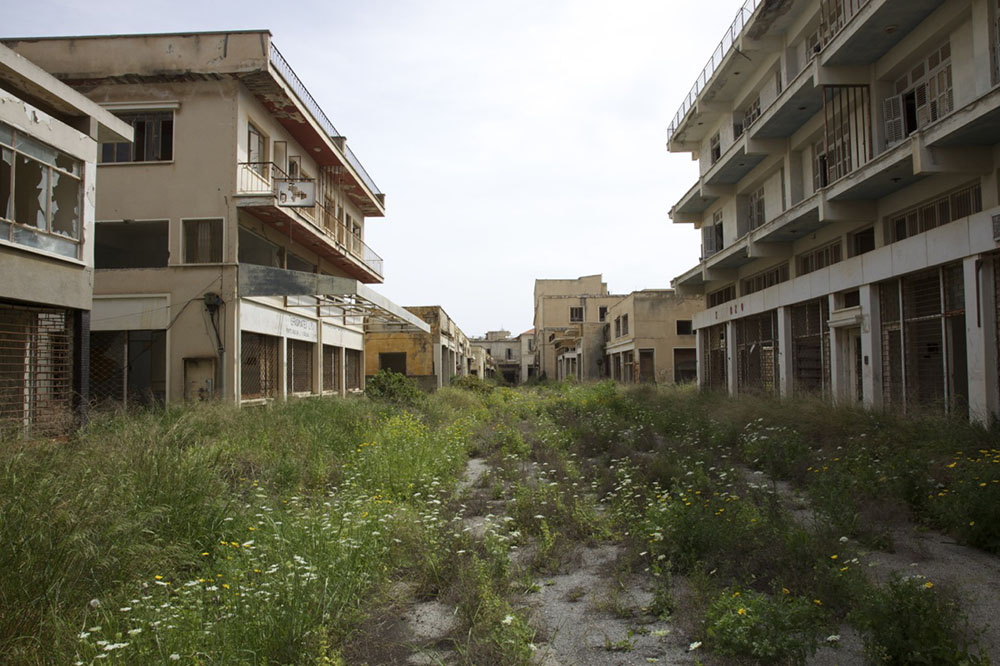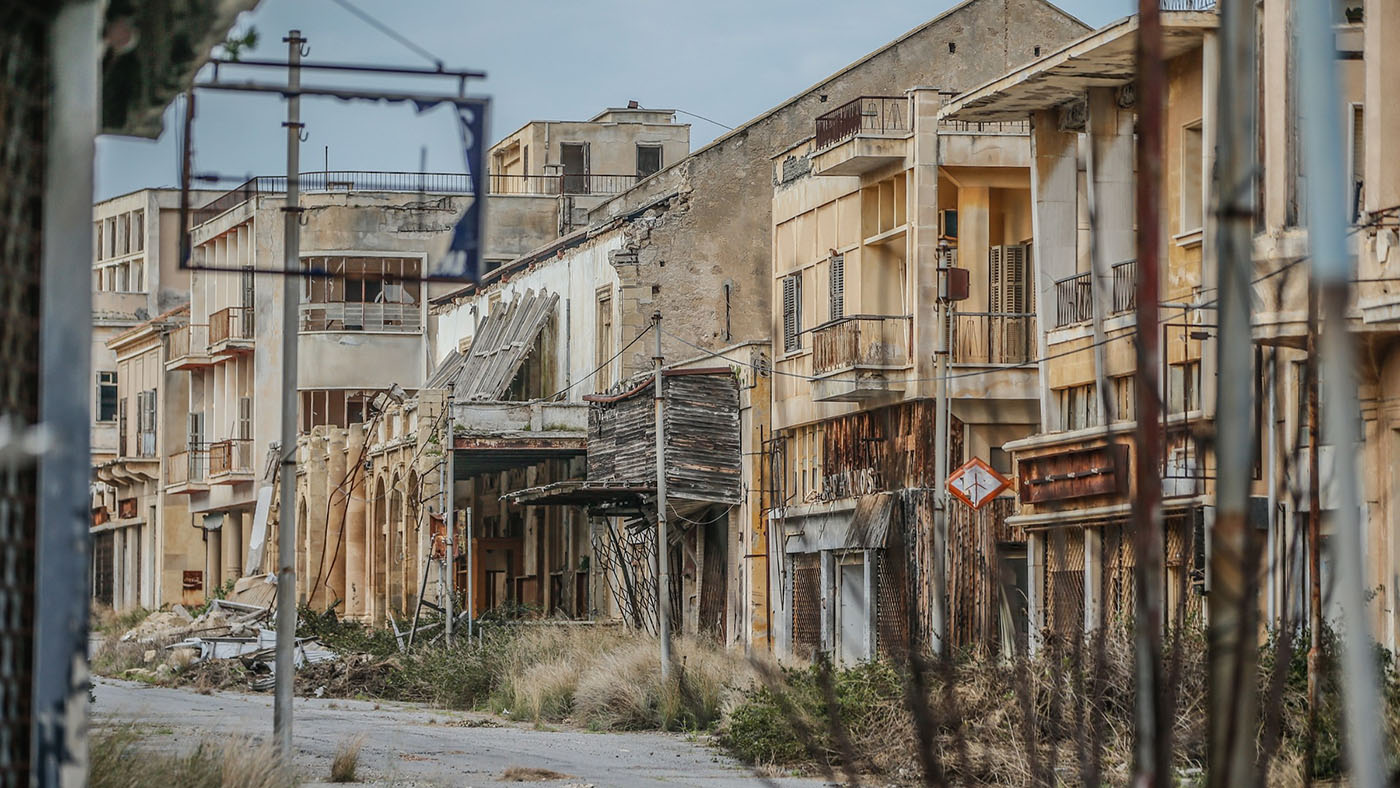In a forcibly evacuated town, a forgotten child gets left behind.
Salamis Aysegul Sentug Tugyan
room number 137 of the Argo Hotel
dear people behind the fence,
this letter is written by a child who will be gone in a trice. this child has been forgotten twice: first at birth, then during the war. he has no home, but he once had many cupboards of his own. never before has he contemplated ending things like this, even in the darkest moments of a decaying past, he was there to endure. but now he has to make himself disown.
this child, now-aged-who-knows-what, was six when the people of Varosi were forced to flee. scared he was that day, remained safely, hidden inside a dusty cupboard of his orphanage; where he stayed long. there, he stayed until the bombs stopped. then time slowed down, and then time stopped. the child grew obscure, the child grew mild. the other side of silence had he become. the child grew thin, he grew wild, he grew inside, he grew alone. houses decayed, cupboards became home.
behind rusty walls vomiting lush greens he’s been hiding in those cupboards. since ’74, he’s been watching the soldiers who do nothing but whistle, watching and threatening those who try to cross the border, border of the sea, border of the land, and border of the mind to capture the purgatory between death and death. since ’74, nothing has changed. crows scavenged, sea foamed, pigeons pooped, soldiers whistled as ordered. and the ghost child of the ghost town has observed his own absence, practicing decay, mastering evanescence. he’s been the silent guard of memories. he’s been the watching eye of this place. he’s been haunted by the consciousness of the space. he’s become the essence of the stories belonging to the displaced.
the ghost child that’s never remembered, never heard, never seen, never felt, the ghost child that couldn’t even be photographed — you know the laws of the land!
before it was plundered and ruined, this place was beguiling, enchanting, and charming — let this dictionary-fed ghost tell you in vain, more of Varosi, the neighborhood of joy, a place of escapades, a worldly zone of pleasure, bringing together the artificial joys of travel with the dreams of littoral leisure. each corner of this hotel room where he crafted home out of its cupboards used to waft the powdery smell of memories: the fresh linen for the beds, waiting for the citrusy perfume of a beautiful woman; the clean aroma of well-shaven men, rich in soap and cocaine; and the smell of the maidservants who bathed twice a day in cheap tobacco cologne.
all gone in one day.
all gone yet the child stayed. he heard the whistles, the cars and the guns — and then the tanks and the bombs. he heard the shouting and the screams. he heard the arrival of soldiers and planes. he did not see people leaving. no one knew that he was there, hiding. no one looked for him. no one came for him. he grew silent. he grew alone. he grew wild he grew alone. he slept in cupboards. he cried in them, he fought monsters in them. he found books in some and he made them shelters. he made forts, he made tunnels, he made castles. he went to the moon, to the center of the world and to unknown jungles. time was suspended. the day was slow, and the night was slower. only azan called to prayer and bells of church gave him a sense of time, in a tone of order, unfamiliar and unknown, and the soldiers gave him a sense of border, with their whistles, where the notion of rules began and ended.
he survived. he ate all the leftovers from the hotels and from the houses. it was one of his best days when he found the piglets they sold at the Famagusta fair. then he began to hunt. he learnt mathematics from the trees, music from the swallows, love from the cats and anger from the sky. he was no man’s son. he became the son of no man’s land. the ghost of the ghost town lived as he remembered.
humanity, louder and louder. rat-a-tat, rat-a-tat. he was scared. he was afraid of becoming … someone. someone like the crook, like the soldier, like the burglar, like the ones who came to plunder … memories. he was not ready.
he is not ready. refusing your laws and forged victories. he hurried up. he wrote the letter. he entered the cupboard. continued writing. he ate the poisoned rat. continued writing. he is not afraid of silence, he is not afraid of dark, he is not afraid of death. ghosts can never be twice-dead. so now, you came, the reader of this letter, who are you? the new owner of this land? the old owner of this land? a crook? a soldier? a politician? a burglar? a sinless passer-by or a curious gazer?
who? you. you trespassed across the barbed wire. you saw the destruction with your own eyes. you stepped on prickly pears and piles of rusted metal. and then, you reached the gates of the dusty past. you passed the fence. you walked among forgotten objects of grave land. you saw a pair of baby shoes, chairs with missing legs, a rusted refrigerator, and mud-covered plates. you felt wretched. you tore the curtain ajar. you looked inside the shattered glass. you wiped the dust on the creaking wooden floor. you opened the door of the cupboard and found him, the ghost, and then you found this letter. you felt it in your stomach first. ruthless. you felt shocked, repelled, and disturbed. the sound of the traffic and the joyful crowd on the beach all suddenly vanished. only this cupboard remained in the world, this secret ivory cupboard, holding him, his memories, and this forgotten void between place and placelessness. where you stand now, with this scrawny pale body that you stand next to but don’t want to look at, is room 137 of the Argo hotel, the home of the most beautiful cupboards in the world. here is nothing but reminiscences of the specter. every place has its memories, but this place belongs only to them.
the ghost of the ghost town will disappear, yet the ruins of humanity will remain. don’t you dare pity for him, pity for yourself as he is no longer. this ghost will be gone but Varosi, the ghost of memories, the refuge of bygones will always remember.
never yours,
the ghost child of a ghost town

Varosha (Varosi, as Varoshians say) means neighborhood in Greek. Before 1974, Varosha, a small Greek-Cypriot neighborhood of Famagusta, was one of the most famous seaside resorts in Europe. In 1974, the year of Turkey’s military intervention, the inhabitants of Varosha fled, hoping to return one day. This “return home” never happened. Varosha was fenced off by the Turkish military, to be used as a political leverage in the peace negotiations. The place has been a ghost town ever since; for more than two decades, entering inside or taking photographs from the outside were strictly forbidden. This changed recently. In 2020, the doors of the ghost town were partially opened to sightseers. The roads have been repaired and decorated with potted flowers in an attempt to make it look “pretty.” While Varosha’s unique situation intrigues tourists, encouraging this attitude of dark tourism by promoting a place’s melancholy in the form of an open-air museum creates unease not only for the town’s previous inhabitants but also for Famagustians who, like me, pass by the site every day.
The phantasmagorical state of Varosha has piqued my imagination since I was a child. My middle and high school was next to the ghost town. Observing the gloomy view for six years, every day, I wildly imagined the possibilities of life there. A form of life that is hidden behind the forbidden, somehow stuck alive between memories of past-life and hallucinations of after-life. A life that is no more. The seeds of this piece called “Room Number 137 of the Argo Hotel” were planted during those high school years. My imagination was fed by the uncanny, melancholic, eerie landscape and by its ghosts that lingered in the territory of my daydreams. “Room Number 137 of the Argo Hotel” was written years before the re-opening of Varosha in 2020, yet the piece remained untouched in the drawer of my desk until the day I found the courage to visit the ghost town myself. I thought I would edit the piece after looking inside the Argo Hotel myself, but I did not. I could not. In fact, I realized that I could not have written this piece had I visited the place first. Emotional distance was necessary to be able to write about it. So, it remained exactly the same as it was first written. In the piece, the reason for the ghost town’s opening is the reunification of the island, something I used to hope for. The ghost of the ghost town lives and dies in this piece, just as this occurred in my childhood fantasies when I was daydreaming in classroom and looking at the broken windows of the wrecked Argo Hotel.
What does ghost town mean? The term was first used to describe abandoned mining towns, and it has since been applied to various places around the world that share the common characteristics of abandonment, ruin, emptiness, decay and the resurrection of nature. The poetic space of a ghost town reflects the idea of the sublime because it emphasizes decay, emptiness, greatness, obscurity, terror, awe and vast desolation. The decaying urban space of Varosha resonates with the sublime not only because of its tangible materiality but also because of what Yael Navaro-Yashin calls the “fantasy element” it evokes: it triggers the fear of life on earth without humans. A ghost town is a space in between, and its dialectical relationships with present and past, place and placelessness, presence and absence reflect Derrida’s concept of hauntology. Colin Davis explains the term as “ontology,” but for Davis, the priority of being and presence is replaced with “the figure of the ghost as that which is neither present nor absent, neither dead nor alive.” Especially in Varosha, which is a forbidden zone, the notion of a ghost town fluctuates between these binary oppositions — life and death, past and present, presence and absence — due to its status as a “suspended space.”
“Room Number 137 of the Argo Hotel” is a hybrid piece; it is both a story, and a prose poem in the form of a letter. The protagonist is a forgotten citizen of a forbidden land. He was a ten-year-old orphan hiding in a cupboard during the intervention. On the day of the imagined reunification of the island, in 2024, he is found dead in a cupboard with a letter beside him. His letter invites us to think about redefining place and placelessness through the spatial exhaustion of a ghost town and explores the fantasy of being identity-less through a life on the verge — a liminal existence — examining how the concept of “place” relates to memory and not an actual sense of the world.




